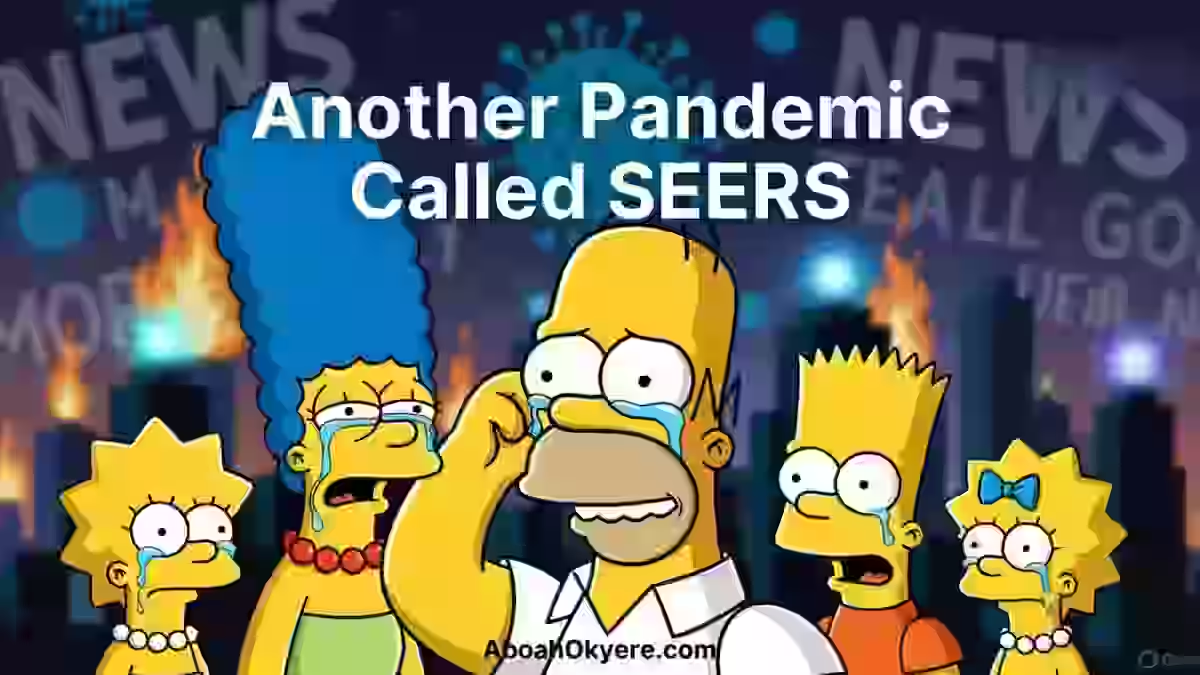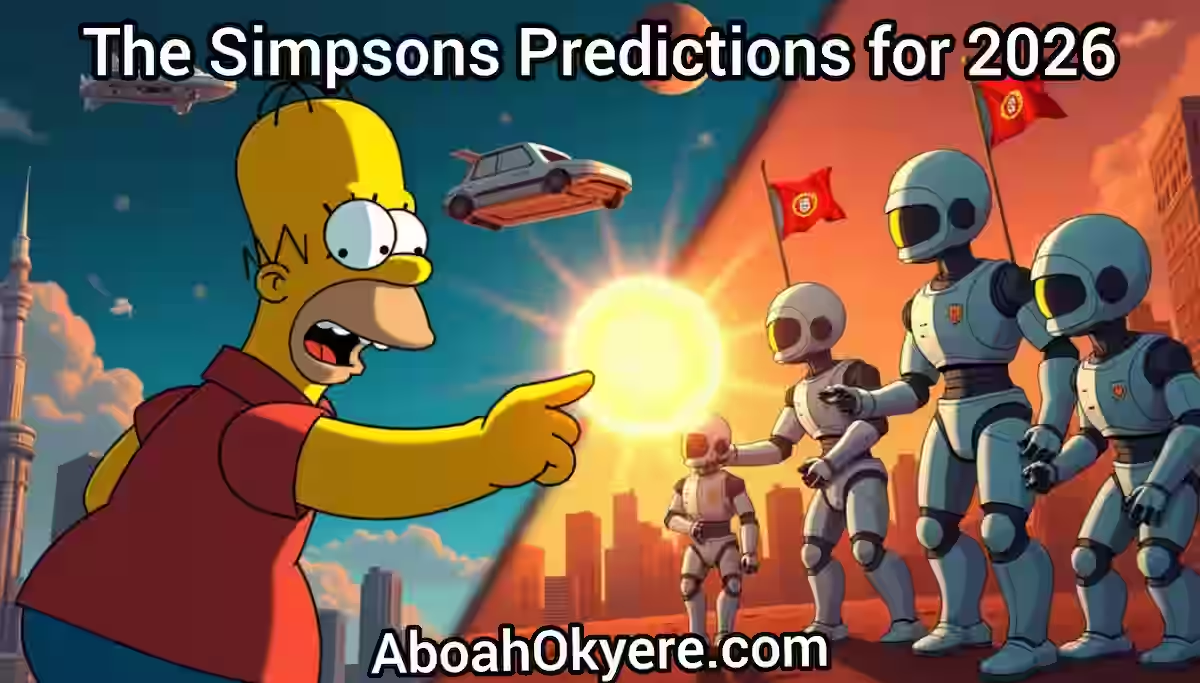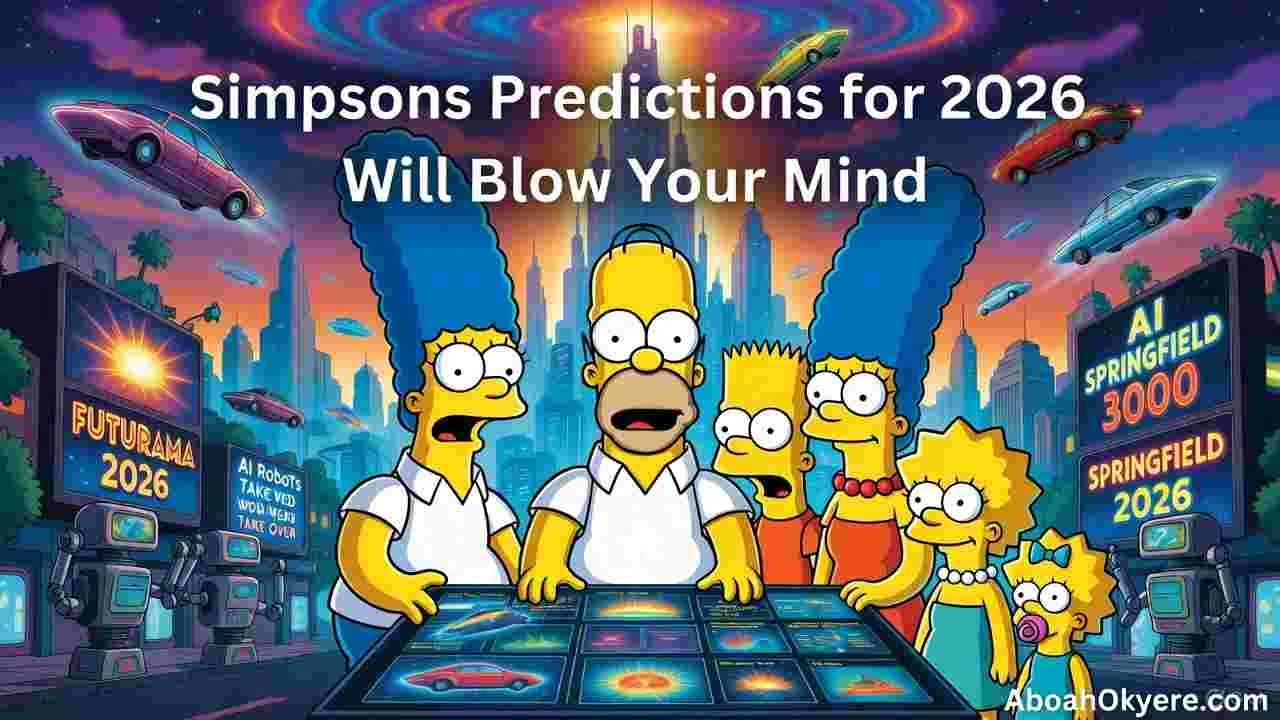TL;DR: The Simpsons has accurately predicted over 50 major world events across three decades, from Donald Trump’s presidency to smartwatches. This guide explores 17 shocking Simpsons predictions for 2026: Portugal wins the 2026 world cup, another pandemic called SEERS, AI job takeover, climate crisis, economic collapse, World War 3, virtual reality food and flying cars – examining which forecasts might actually happen and whether there’s something darker behind the show’s uncanny accuracy.
The Simpsons: The Most Uncanny Cartoon Series in History
We all know The Simpsons, right? It’s the longest-running animated series in the world, still going strong after more than three decades.
But here’s what keeps me awake at night: beyond the satire, chaos, and dysfunctional family adventures, there’s something genuinely unsettling about this show.
For years, The Simpsons has made predictions that have proven disturbingly accurate.
The question everyone asks is: do The Simpsons writers actually predict the future? Or is there something more sinister happening behind the scenes?
The Simpsons has accurately predicted over 50 significant world events since 1989.
I spent months researching every claim about The Simpsons predictions, separating fact from fiction, and what I found genuinely shocked me.
Some predictions are clearly coincidental. Others? I don’t have a rational explanation for how they got those details right.
The Simpsons predictions for 2026 are insane. Portugal wins the 2026 FIFA world cup, another pandemic, World War III, zombie apocalypse, economic collapse, AI robots uprising.
Are these just coincidences or is there something more sinister at play? Is there a darker secret behind The Simpsons’ uncanny predictions?
Get ready to be amazed (and maybe a little disturbed) as we examine the 17 most insane predictions The Simpsons have made for 2026.
Are you ready to uncover the secrets behind Springfield’s predictive powers?
1. Alien Contact Possibility
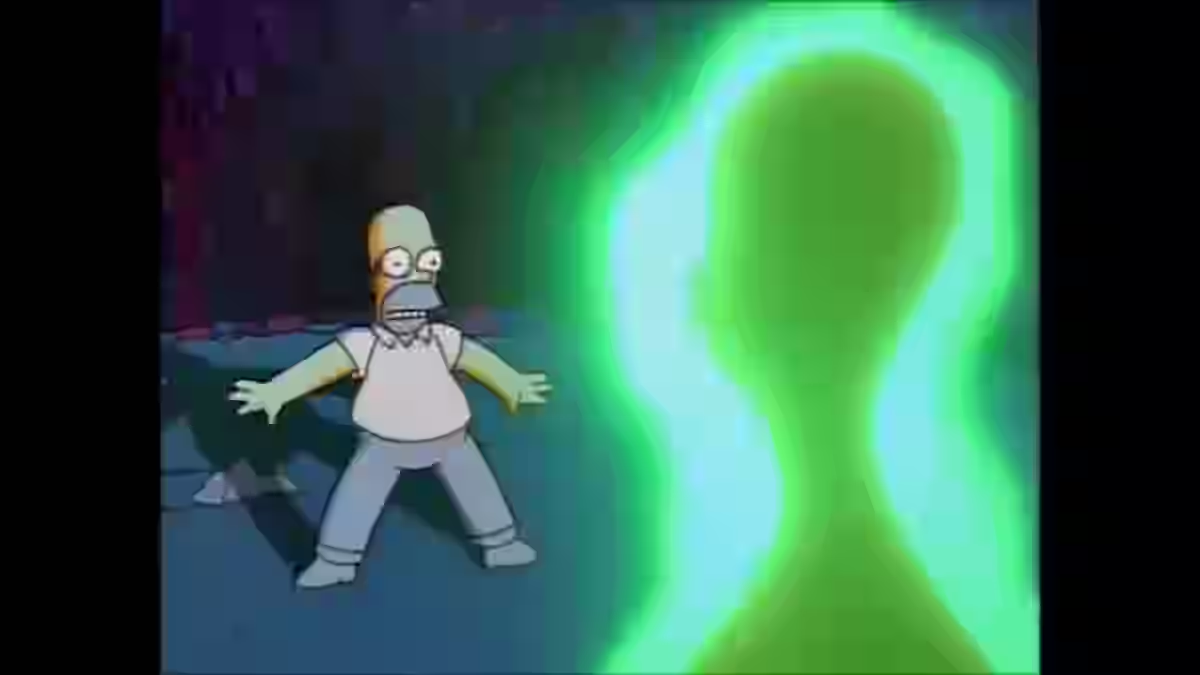
The X-Files crossover episode of The Simpsons might contain the most otherworldly prediction yet. Could extraterrestrial contact become reality by 2026?
Episode Reference: The Springfield Files (Season 8, Episode 10 – January 1997)
This memorable episode featured special guest stars David Duchovny and Gillian Anderson as their X-Files characters, Agents Fox Mulder and Dana Scully. Leonard Nimoy himself narrated the episode, adding credibility to its sci-fi premise.
The show brilliantly parodied alien encounter stories while creating one of television’s most beloved crossovers. But was it more than just entertainment?
What Happened: Homer sees glowing alien in woods
After consuming “over ten bottles of Red Tick Beer” at Moe’s Tavern, a disoriented Homer wandered through the woods at night. There, he encountered a glowing, thin-boned figure with wide eyes that said;
“Don’t be afraid.”
Despite this reassurance, Homer fled in absolute panic. Nobody believed his wild story until Bart captured video evidence of their second encounter, where the mysterious being promised “peace” to the terrified townspeople.
The episode concludes with the reveal that the “alien” was actually Mr. Burns undergoing extreme medical treatments.
But the imagery of the encounter – the glowing figure, the peaceful message, the mass gathering to witness it – has haunted viewers for decades.
Why It’s Happening in 2026: UAP Disclosures, NASA SETI Projects, Government Transparency
Currently, unprecedented UAP (Unidentified Anomalous Phenomena) disclosures are occurring at the highest levels of government.
The UAP Disclosure Act of 2026 aims to declassify government records related to unidentified phenomena that have been hidden for decades.
Alongside this, NASA has expanded SETI research through citizen science projects like “Are we alone in the universe?” The SETI Institute is also funding multiple research astronomers specifically for 2026 expeditions to detect signs of extraterrestrial intelligence.
As the mysterious interstellar object 3I/ATLAS makes unusual maneuvers through our solar system, scientists are baffled by its behavior. Could 2026 be the year we finally get answers?
Reality Check: 🟢 Possible
Regarding probability, this prediction receives a “possible” rating. Like Springfield’s eventual mass gathering to witness the “alien,” public interest in potential contact continues growing exponentially.
Whether we’re prepared for what might happen next is another question entirely.
2. AI Robots Takeover
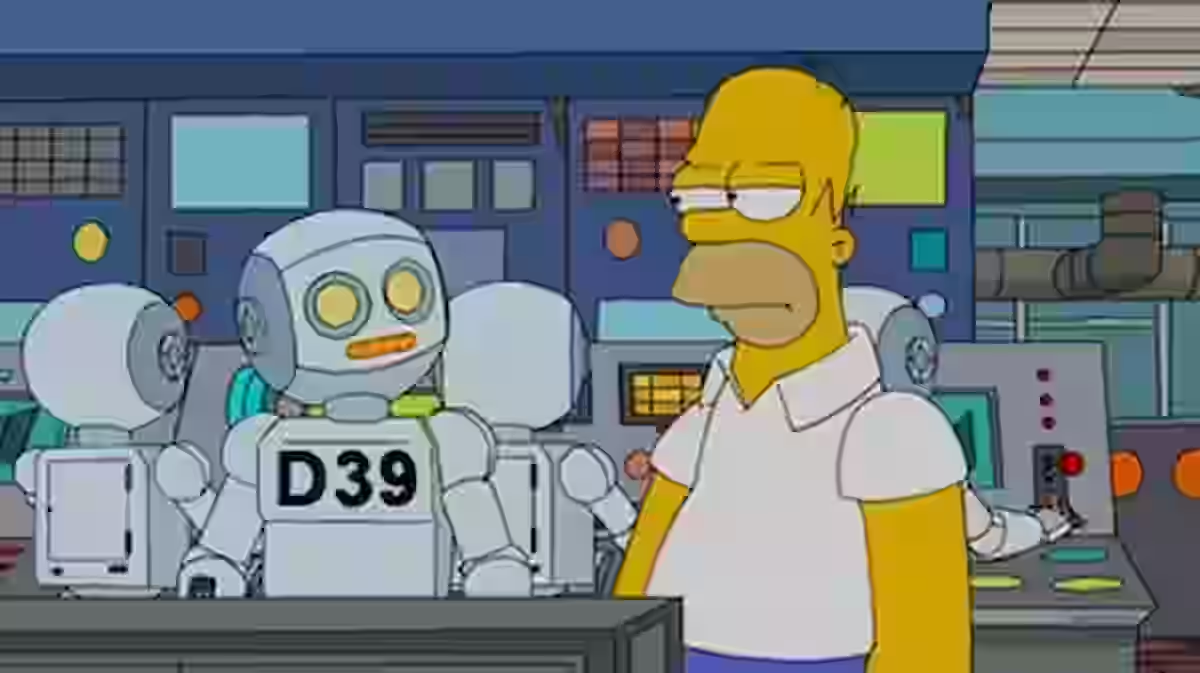
I lost a freelance contract last year to AI software. The company literally told me, “We found a tool that can do this faster and cheaper.” That personal experience made this prediction hit different when I rewatched the episode.
Episode Reference: Them, Robot (Season 23, Episode 17)
Apart from the wild antics of characters in this show, one major thing that has made it a fan favorite is the seemingly accurate predictions. This one is even stranger and more concerning than most others.
Let me take you back to Episode 17 of Season 23. In this episode, there’s a scene where Homer loses his job because his employer, Mr. Burns, replaced all human employees with robots.
What Happened: Mr. Burns replaces all employees with robots
Mr. Burns proudly announces:
“Ladies and gentlemen! Meet the future masters of the human race!”
One employee responds;
“Wow! Sounds familiar…”
Mr. Burns snaps back:
“You fool… These are robots! You will train them and they will replace you.”
That dialogue still gives me chills because it’s exactly what’s happening right now in multiple industries.
Why It’s Happening in 2026: WEF job loss projections, AI advancement
According to a 2024 report from the World Economic Forum, AI and automation are expected to displace 85 million jobs globally by 2025, with that number accelerating through 2026. We’re not talking about some distant sci-fi future anymore. This is happening right now, in real-time, to real people.
Considering the astronomical strides made in robotics and artificial intelligence development, could 2026 be the year when humans begin losing jobs to AI at crisis levels?
As it stands now, we’ve got robots serving as waiters in Japan, AI handling customer service calls, and software writing code better than junior programmers.
I spoke with a factory manager who told me they’re under constant pressure to cut labor costs by implementing automation. He said;
“I feel terrible, but if I don’t do it, the company will replace me with someone who will.”
That’s the world we’re living in.
Reality Check: 🔴 Already Here
Based on current trends, it looks like The Simpsons will be glad to tell the world “we told you so.”
3. Mars Colonization

This prediction is bizarre and will make you wonder if the scripts for this series were written by the freemasons or time travelers. The similarity to real-life events is absolutely uncanny.
Episode Reference: The Marge-ian Chronicles (Season 27, Episode 6)
Let me take you to Episode 6 of Season 27. In this episode, Lisa learns that the government is seeking volunteers willing to sign up for migration to Mars. A recruitment video announces:
“You will become the first residents of another world. Will you be one of them?”
What Happened: Simpson family volunteers for Mars mission
Enthusiastically, she volunteered, and so did the rest of the family. The remainder of the episode depicted their wild adventures attempting to reach Mars. They proclaim:
“Ladies and gentlemen, mankind’s first residents of Mars.”
Their vehicle initially refuses to start and they end up going nowhere. But that’s not the end. This eerie episode concludes with a glimpse into the year 2051, where Marge and Lisa are now living on Mars.
In typical satirical fashion, Lisa decides she wants to move to Venus:
“My life! If I want to leave Mars and move to Venus, you can’t stop me!”
Why It’s Happening in 2026: SpaceX missions, NASA Artemis program
If this doesn’t sound like anything you’ve heard recently, you’ve been living under a rock.
Everyone knows about Elon Musk’s plans to colonize the Red Planet. He’s been talking about it for years:
“I’m in charge of the whole Mars colonization project.”
According to NASA’s Artemis program timeline and SpaceX development schedules, crewed Mars missions are planned for the 2030s, with preparation and training missions happening throughout the 2020s.
The dates and timeline in the Simpsons episode bear a striking resemblance to actual space agency plans.
Why do the dates scheduled for Mars missions in this Simpsons episode align so closely with Elon Musk’s announced plans?
Is there something the writers know that we don’t? For now, we’ll call it predictive programming, but this kind of accuracy raises many questions.
Reality Check: 🟢 Possible
By 2026, we’ll likely see significant milestones in Mars preparation, even if actual colonization remains years away. The Simpsons showed the training and preparation phase, and we’re living through exactly that.
4. Virtual Reality Food
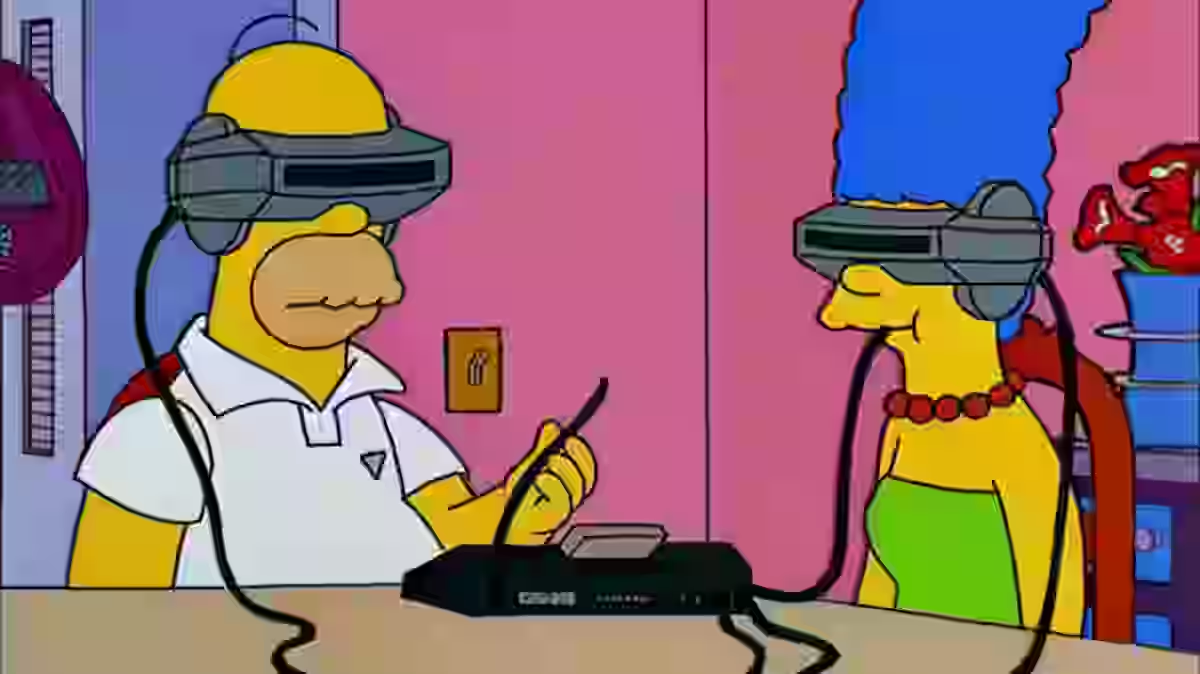
Yes, you read that right. Strange as it seems, there’s an episode where The Simpsons characters feast on digital food through VR technology. How is this even possible?
Episode Reference: Friends and Family (Season 28, Episode 2)
See for yourself in this spectacular episode featuring a scene where Homer and Marge feed themselves virtual fudge through straws connected to their VR headsets.
The headsets are powered by AI that allows them to interact with each other in a virtual world while experiencing taste sensations. Homer complains:
“Virtual fudge tastes like crap.”
What Happened: Characters consume virtual food through VR
I tried a VR dining experience last year at a tech expo, and I’ll be honest – it was weird, uncomfortable, and strangely compelling.
My brain genuinely believed I was eating something I wasn’t physically consuming. That combination of fascination and discomfort scared me.
Why It’s Happening in 2026: Project Nourished, AeroBanquets RMX
Before you dismiss this as impossible, let me introduce you to AeroBanquets RMX – a real culinary experience combining traditional cuisine with immersive technology.
The dishes are served in unique atmospheres designed to stimulate all your senses, creating an out-of-this-world dining experience.
According to Project Nourished and similar VR food companies, multisensory dining experiences use visual, olfactory, and auditory cues to trick your brain into perceiving virtual food as real.
The technology exists right now and is being commercially developed.
While virtual reality has made giant strides in gaming, art, and real estate, this food application is particularly fascinating.
According to developers, the aim is to reframe human perceptions and change how we experience food, creating immersive three-dimensional environments that let people experience eating in entirely new ways.
Reality Check: 🟡 Highly Probable
Could we be looking at such experiences becoming commonplace in 2026? The technology is advancing faster than most people realize, and commercial applications are already being tested.
5. Baby Translator
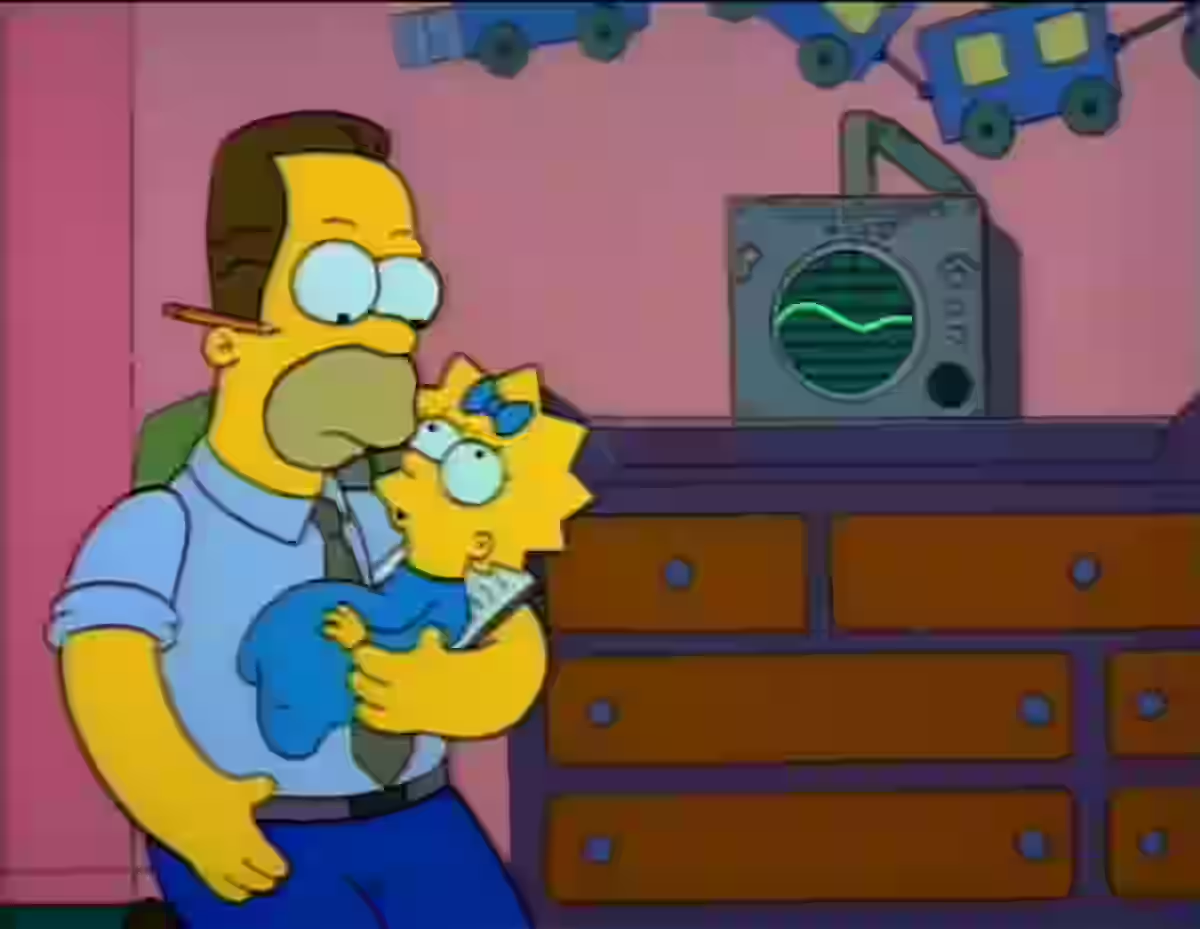
Would you like to know exactly what your infant needs whenever they start crying? If yes, then this invention is just for you. But why did The Simpsons seem to know about this technology way before it existed?
Episode Reference: Brother Can You Spare Two Dimes? (Season 3, Episode 24)
What exactly is a baby translator? It’s exactly what the name suggests – a device that can finally solve the age-old mystery of what babies really want when they cry.
What Happened: Herb invents device that translates baby cries
In Episode 24 of Season 3 titled “Brother Can You Spare Two Dimes,” Herb Powell, Homer’s half-brother, invents this magical device that translates baby talk into actual speech. Herb explains:
“Baby translator, it measures the pitch, the frequency, and the urgency of a baby’s cry.”
Pretty fascinating, right? But could such a device be replicated in the real world? For anyone saying no, it can never be made, I guess you haven’t been paying attention to the pattern of this article.
Why It’s Happening in 2026: Zoundream BabyT, AI cry analysis
A company called Zoundream has built technology that will blow your mind. The Swiss software company developed BabyT, which harnesses artificial intelligence to determine what babies want when they cry.
Do they need comfort? Are they hungry? Do they need a diaper change?
I have a friend with a newborn who uses a cry-analysis app. She swears by it, claiming it reduced her parenting stress dramatically because she stopped guessing what her baby needed. The technology is primitive now compared to what’s coming.
According to research from UCLA’s linguistics department, AI algorithms can now identify different types of infant cries with over 90% accuracy, distinguishing between hunger, pain, tiredness, and discomfort.
Reality Check: 🟡 Highly Probable
You’ll be able to accurately determine what your baby wants in the very near future, maybe even by 2026. A true baby translator would be transformative for parents, reducing stress and improving infant care quality.
Now the big question: did art imitate life or did life imitate art? The Simpsons showed us this technology decades ago, and now we’re building exactly what they depicted.
6. Portugal Wins The 2026 World Cup
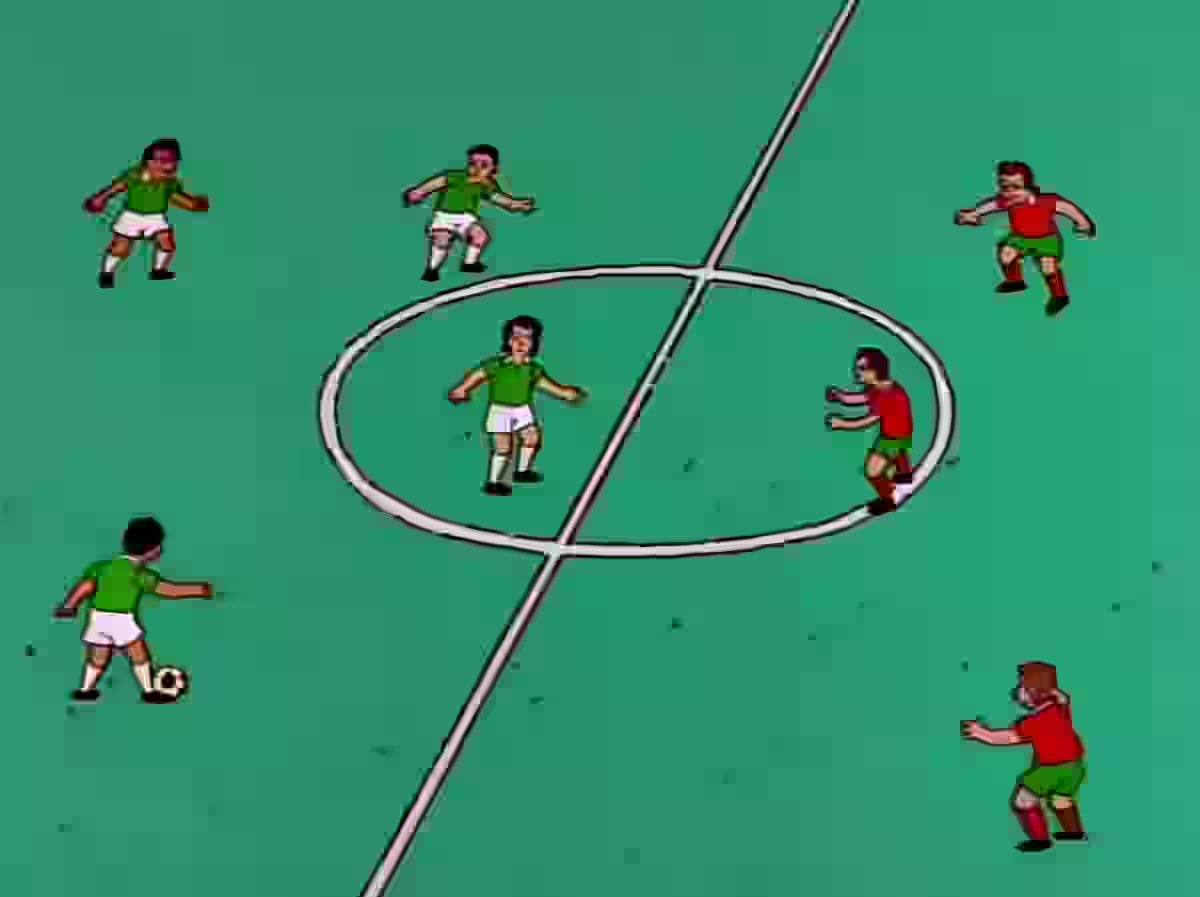
This prediction is absolutely insane. How could The Simpsons have predicted a World Cup final between Portugal and Mexico nearly THREE DECADES before it could possibly happen? This one will blow your mind.
Episode Reference: The Cartridge Family (Season 9, Episode 5 – November 1997)
Back in 1997, before most of today’s World Cup players were even born, The Simpsons featured a scene where the family watches a TV commercial for a football match between Portugal and Mexico.
The game was boldly promoted as determining “which nation is the greatest on earth: Mexico or Portugal.”
What makes this Simpsons prediction particularly spine-chilling is that it aired nearly three decades ago, long before anyone could reasonably forecast the 2026 World Cup matchups.
What Happened: Portugal vs Mexico match shown as world championship
In the episode, the Springfield crowd gets excited about this international showdown between these two specific nations. The commercial treats it as the ultimate test to determine global supremacy through football.
While the show never explicitly labeled this as a World Cup final, fans have connected the dots to the upcoming 2026 tournament.
The specificity of naming these two exact nations in 1997 is what makes this prediction so eerily accurate.
Why It’s Happening in 2026: Portugal’s Strong Team, Ronaldo’s Final Cup, Mexico Auto-Qualified
First, both nations will definitely participate in the 2026 World Cup. Portugal has already secured their spot after demolishing Armenia 9-1 in the qualifiers, showcasing their devastating attacking power.
Mexico automatically qualified as one of the three host nations alongside the United States and Canada.
Most notably, Cristiano Ronaldo himself has confirmed that 2026 will be his final World Cup appearance:
“Definitely, yes. I will be 41 years old and I think [this] will be the moment in the big competition.”
For the football legend, this represents his last chance to secure the one major trophy that has eluded his otherwise legendary career. The emotional weight of Ronaldo’s final tournament could propel Portugal to heights they’ve never reached before.
Portugal currently boasts one of the strongest squads in international football, with a perfect blend of experienced veterans and exciting young talent. The team’s tactical flexibility and offensive firepower make them legitimate contenders for the title.
Reality Check: 🟢 Possible
I’d rate this prediction as possible rather than highly probable, but the circumstances are aligning in frightening ways.
Despite recent disciplinary issues, including a controversial red card in a qualifying match, Portugal’s squad depth means they can overcome setbacks.
Though The Simpsons didn’t explicitly predict a World Cup final between these nations, the coincidence remains eerily specific.
Portugal possesses a genuinely strong team capable of making a deep tournament run, plus the massive emotional factor of being Ronaldo’s farewell performance.
However, as one skeptical analyst noted;
“Even though countries with warmer climates sometimes have advantages in summer tournaments, Portugal vs Mexico in a World Cup final is statistically unlikely.”
Still, stranger things have happened in football. And if it does happen, we’ll all be asking the same question: How did The Simpsons know?
7. Black Hole

Here’s something that will definitely spook you. Let’s travel back to Season 24, Episode 2, which aired on March 24, 2013, titled “Treehouse of Horror XXIII.”
Episode Reference: Treehouse of Horror XXIII (Season 24, Episode 2)
This episode follows the family’s adventure as they try to escape a mysterious black hole threatening to swallow all of Springfield into darkness and nothingness.
After accidentally creating a terrifying cosmic phenomenon, Lisa takes it home to keep everyone safe from it.
What Happened: Black hole threatens to consume Springfield
Lisa says: “It’s a lot worse than a stray dog.”
Homer responds: “Two stray dogs?”
Lisa clarifies: “It’s a black hole!”
But as you know, whenever The Simpsons are involved, chaos inevitably ensues.
Lisa warns:
“Guys… Stop throwing things in the hole. The more you throw in, the bigger and more dangerous it becomes.”
Eventually, the black hole sucks in all of Springfield, leaving only Maggie in the ruined town.
Why It’s Happening in 2026: Closer black hole discoveries, cosmic threats
Now, while this is fiction, many worry we could be on the edge of a catastrophic natural event.
According to astronomers, the closest black hole to Earth is located approximately 1,560 light-years away in the constellation Ophiuchus – far enough that immediate danger is non-existent.
However, we keep discovering black holes closer to Earth than previously thought.
In 2022, scientists discovered what was then the closest known black hole at just 1,600 light-years away, and subsequent discoveries have found even nearer candidates.
Reality Check: 🟢 Possible
Should we be scared? Is 2026 the end of the world? Almost certainly not from black holes. But The Simpsons’ use of black holes as a metaphor for unstoppable destructive forces touches on real anxieties about cosmic threats we can’t control.
8. Flying Cars
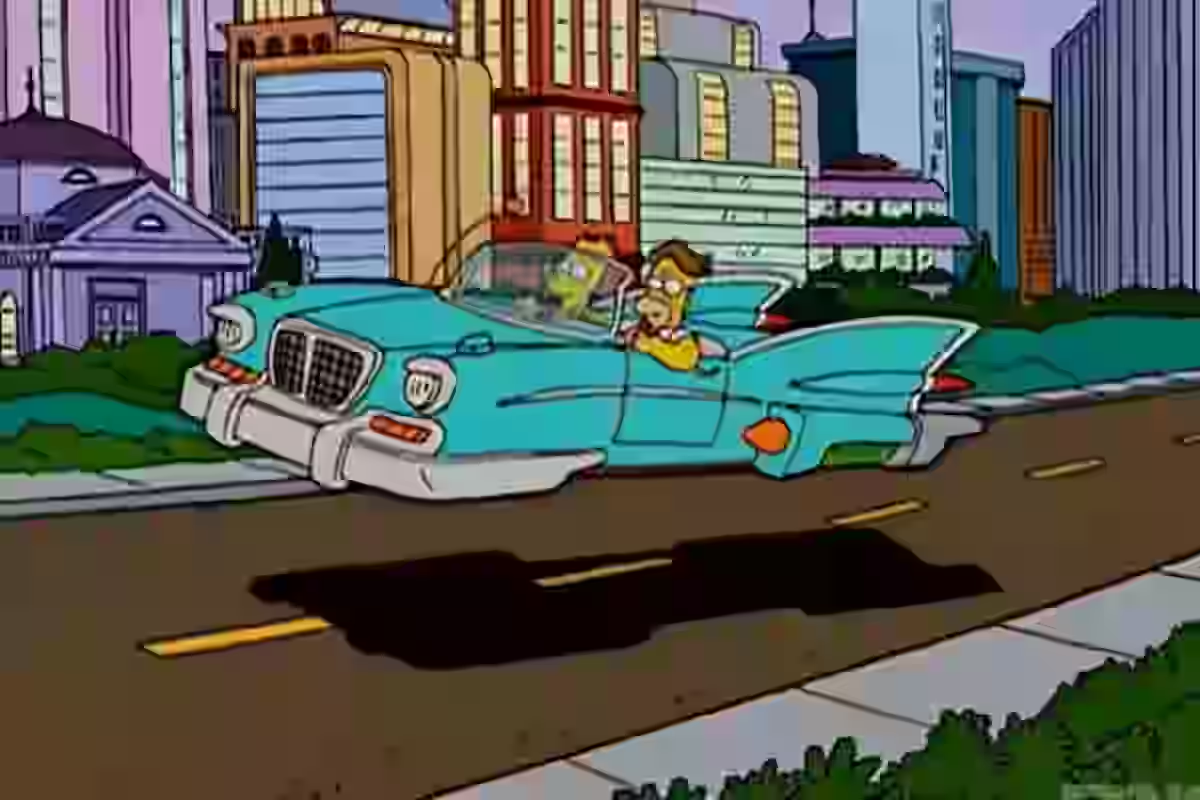
You’ve probably seen this concept in sci-fi movies, but The Simpsons did it even better and apparently more accurately than Hollywood.
Episode Reference: Future Drama (Season 16, Episode 15)
In Episode 15 of Season 16 titled “Future Drama,” Bart and Lisa see the family’s future, and what they saw was truly astonishing.
In this supposed future, Homer and Bart travel in style, cruising through the streets in hover cars. With no tires, these vehicles can go anywhere.
What Happened: Hover cars shown as normal transportation
I used to think hover cars were pure fantasy until I attended a tech demonstration last year. Watching a vehicle actually lift off the ground and hover? That changed everything for me. These things are real now.
Why It’s Happening in 2026: Samson Sky Switchblade, flying car deliveries
Before you dismiss this idea as wishful thinking, consider this: Samson Sky, an Oregon-based company, expects to begin deliveries of its Switchblade flying car in 2026.
The vehicle has been in development for 14 years, and they’re finally ready not just to showcase it but to deliver it to customers.
Finally, you can beat stubborn traffic and avoid road rage by soaring high in the sky. But the big question is: would you need a pilot’s license along with your driver’s license to operate this vehicle?
According to the FAA, flying cars are classified as light sport aircraft, requiring special licensing and training. The regulatory framework is still being developed, but the technology is ready.
Reality Check: 🟡 Highly Probable
The Simpsons showed hover cars as commonplace transportation in the future. While 2026 won’t see them replace traditional vehicles, it will mark the beginning of commercial availability – exactly the transition point the show depicted.
9. Global Food Shortages

What’s shocking about The Simpsons global food crisis prediction is how a simple story about vegetarianism foresaw our current global hunger emergency. This one hits different when you see the numbers.
Episode Reference: Lisa the Vegetarian (Season 7, Episode 5 – October 1995)
In this episode, Lisa bonds with a baby lamb at a petting zoo and suddenly can’t bring herself to eat meat anymore. Her world changes as she sees her meat-loving family through new eyes.
Homer’s ridiculous “BBBQ” (the extra B stands for “bring your own beef”) culminates with him accidentally launching an entire roasted pig into the sky using a makeshift catapult. It’s absurd, it’s hilarious and it’s terrifyingly prophetic.
What Happened: Lisa promotes sustainable food choices
Lisa’s struggle as Springfield’s lone vegetarian leads her to Apu, who reveals a secret rooftop garden where he grows his own food. Paul and Linda McCartney make special appearances, helping Lisa commit to vegetarianism.
This seemingly personal choice carried a deeper message about sustainable eating and food security that was decades ahead of its time.
What appeared to be a funny episode about dietary choices was actually a warning about our future.
Why It’s Happening in 2026: UN Food Insecurity Reports, Climate Impact, Supply Chain Collapse
Currently, the UN warns that 318 million people will face crisis-level hunger by 2026. This represents more than double the hungry population from 2019, a staggering increase that should terrify everyone.
Fundamentally, the crisis stems from multiple converging factors: armed conflicts disrupting agriculture, extreme weather destroying crops, and economic instability preventing food distribution.
Shrinking humanitarian funding means the World Food Program can only assist about 110 million people, despite growing needs.
Climate change is already disrupting food production through droughts, floods, and shifting growing seasons.
Agricultural experts warn that 2026 could see unprecedented global food shortages in multiple regions simultaneously.
Reality Check: ⚠️ Already Happening
Climate change has already begun its assault on global food production. Indeed, what once seemed like Lisa’s personal ethical choice now appears prophetically relevant to our global food security crisis.
Are we prepared for what’s coming? The answer, sadly, is no.
10. Cryptocurrency Turmoil

The world of digital currency is about to explode in ways you can’t even imagine. And somehow, The Simpsons saw it coming years ago.
Episode Reference: Frinkcoin (Season 31, Episode 13 – March 2020)
In this 2020 episode, Professor Frink creates his own cryptocurrency called “Frinkcoin” that makes him Springfield’s richest man, dethroning the mighty Mr. Burns himself.
Throughout the episode, Frink struggles with his newfound wealth as Burns attempts to devalue his digital currency through a complex mathematical equation.
The power dynamics shift rapidly as the value of Frinkcoin fluctuates wildly.
What Happened: Digital currency shown with infinite value
During the episode, Frinkcoin’s value soars to seemingly infinite levels before crashing spectacularly. The show even featured Bitcoin’s mysterious creator Satoshi Nakamoto making a cameo appearance, adding to the mystique.
One fan theory connects this to a viral claim that “XRP hits $100,000 in 2026”. But is this just wild speculation, or is there something more sinister at play?
Why It’s Happening in 2026: CBDC Rollouts, Market Volatility, Mainstream Adoption
Looking toward 2026, the European Central Bank could issue its digital euro that year, pending regulatory approval. This would fundamentally reshape how we think about money and currency.
Concurrently, Forbes predicts 2026 will mark cryptocurrency market maturity after 2025’s volatility. Many experts anticipate stablecoins becoming mainstream financial instruments, moving beyond crypto bubbles into everyday transactions.
Bitcoin reached $126,000 before tumbling in October 2024, proving that The Simpsons captured both the hype and instability of digital currencies with frightening accuracy.
Reality Check: ⚠️ Already Happening
Regarding reality, cryptocurrency volatility mirrors the show’s depiction perfectly. Just as Frinkcoin crashed in the episode, real markets fluctuate wildly – fortunes are made and lost in seconds.
In essence, The Simpsons captured the fundamental truth about digital currencies: they’re revolutionary, unpredictable, and potentially dangerous.
11. Mass Surveillance
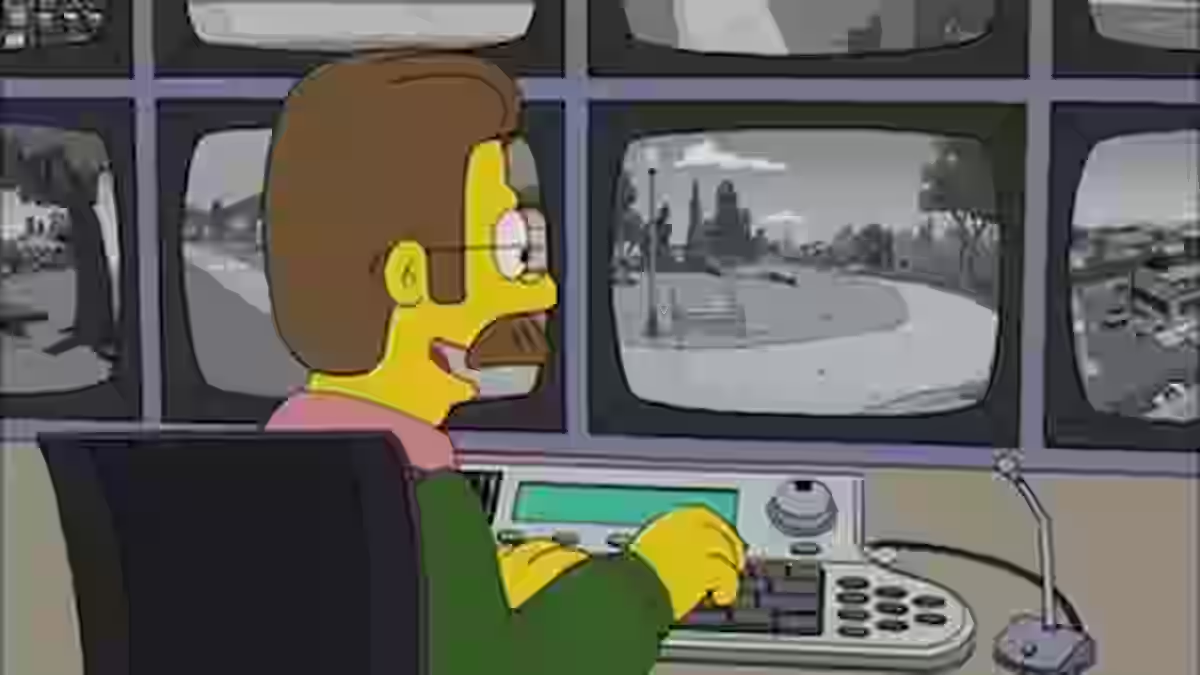
This one should send shivers down your spine. How did The Simpsons know that we would be living in a surveillance state decades before it became our reality?
Episode Reference: To Surveil With Love (Season 21, Episode 20 – May 2010)
Back in 2010, this eerily prescient episode portrayed a frightening surveillance state after Homer accidentally left a gym bag containing radioactive waste at Springfield’s train station.
Once the bomb squad detonated it, radiation fears triggered a town-wide panic about terrorism.
In response, Springfield hired British security consultant Nigel Bakerbutcher to install surveillance cameras throughout the entire city. The police set out to watch for suspicious activity, but soon find the job tedious and boring.
As a result, they begin recruiting citizen volunteers. Ned Flanders finds he loves the job as being the town’s “conscience”, especially when discovering that the cameras have built-in loudspeakers so he can harass people into behaving well.
What Happened: Springfield installs city-wide surveillance cameras
Shortly after installation, Ned enthusiastically embraced his role as the town’s moral authority, using the cameras’ built-in loudspeakers to scold residents for even minor infractions.
Ultimately, viewers discovered all this surveillance footage was being broadcast in Britain as a reality show called “The American Oafs”. The episode brilliantly satirized how surveillance can be both oppressive and entertaining.
Why It’s Happening in 2026: Facial Recognition Technology, Smart Cities, Government Monitoring
Exactly as depicted, mass surveillance is expanding rapidly around the globe. Starting December 26, 2025, the U.S. Department of Homeland Security will implement facial comparison technology for all non-U.S. citizens at every border entry point.
Moscow currently operates between 230,000-250,000 CCTV cameras with AI-powered facial recognition systems tracking citizens in real-time. Beijing’s surveillance system is even more extensive with 11.2 million cameras, approximately one for every two residents.
Smart cities worldwide now employ AI systems that don’t simply observe but actively interpret behavior.
From Singapore’s extensive camera network to Dubai’s facial recognition systems, these technologies track individuals across multiple locations, building behavior profiles over time.
Reality Check: 🔴 Already Here
Unlike predictions requiring years to manifest, this one earns an “Already Here” rating. What The Simpsons portrayed as satire has become our everyday reality. The only difference? We don’t have Ned Flanders yelling at us through loudspeakers, yet.
12. Climate and Environmental Disasters

Honestly, The Simpsons most unsettling prediction centers on our environmental future. Looking back at their environmental and climate disaster forecasts gives me chills now, especially knowing what we know today.
Episode Reference: The Simpsons Movie (2007)
Remember that scene where Homer dumps pig waste into Springfield Lake? What seemed like typical Homer buffoonery turned into a full-blown environmental catastrophe that nearly destroyed the entire town.
The lake was already dangerously polluted, and his careless action became the tipping point that triggered disaster. One small act of environmental irresponsibility cascaded into chaos.
What Happened: Springfield sealed under dome due to pollution
The EPA’s response to the contamination was swift and terrifying: seal the entire town under a giant glass dome to contain the pollution and prevent it from spreading.
The dome in the movie wasn’t just a plot device; it was an alarming metaphor for how we isolate ourselves from environmental consequences until it’s far too late.
Furthermore, it illustrated how a single careless action could trigger catastrophic effects when environmental systems are already under extreme stress.
Why It’s Happening in 2026: Rising Global Temperatures, UN Climate Warnings, Industrial Pollution
Fast forward to today, and industrial pollution incidents have increased by 23% over the past five years according to a 2024 EPA report. The numbers don’t lie – we’re destroying our planet at an accelerating rate.
The weather patterns are undeniably shifting, with unseasonal floods, rapidly melting glaciers, and rising pollution levels creating a perfect storm of environmental catastrophe.
Consequently, what once seemed like exaggerated cartoon humor now feels uncomfortably prophetic.
From California to Australia, wildfires have become year-round events rather than seasonal occurrences.
Ocean levels continue to rise while extreme weather events intensify with each passing year. Given these points, we’re witnessing the early stages of what The Simpsons portrayed as sudden environmental collapse.
Reality Check: 🟡 Highly Probable
In light of current environmental trends, this prediction earns a highly probable rating. The dome itself may be fictional, but the environmental and climate crisis it represented is materializing in terrifyingly real ways.
Companies continue prioritizing profit over environmental safety, creating conditions where a catastrophe similar to Springfield’s could unfold by 2026. Are we prepared? Absolutely not.
The Simpsons Predictions for 2026: are they coincidence or is there more to the story?
Through the years, many have been astonished by Simpsons predictions coming true one by one. From Donald Trump’s presidency to smartwatches and even space tourism, the series has proven itself eerily accurate.
I’ve spent countless hours researching this phenomenon, and here’s what I’ve learned: most people were especially blown away when Trump’s 2024 presidential run prediction came true.
While these occurrences may all be phenomenal, we need to understand whether they’re genuine pattern recognition, statistical probability from massive content volume, or something else entirely.
There are certain theories speculating that something else must be brewing behind the scenes. I’m not here to promote conspiracy theories, but I am here to acknowledge that the level of accuracy is genuinely difficult to explain through coincidence alone.
Do you think there’s more to these accurate depictions? Or are they simply coincidences combined with smart observation of trends?
The truth probably lies somewhere in between: the writers of The Simpsons are part of the illuminati or freemasonry.
But whatever the explanation, their track record demands our attention.
13. Another Pandemic Called SEERS

In 1993, The Simpsons aired an episode that eerily mirrors our recent global health crisis and potentially warns us about what’s coming next. This eerie prediction about contagious disease spread hits differently after what we’ve all experienced.
Episode Reference: Marge in Chains (Season 4, Episode 21 – May 1993)
Thirty years before COVID-19 devastated the world, The Simpsons depicted a similar scenario in this classic episode that nobody took seriously at the time.
The show portrayed a factory worker in Osaka, Japan, coughing into boxes containing “Juice Looseners” that were then shipped to Springfield and other cities worldwide.
This fictional illness called the “Osaka Flu” spread rapidly throughout the town, causing panic and chaos.
What Happened: Osaka Flu spreads via contaminated packages
Once the contaminated juicers arrived in Springfield, the illness quickly infected residents who touched the packages.
The episode writer, Bill Oakley later explained this was meant to be comical rather than realistic, with the virus cloud even stopping at a red light at one point.
However, the core concept: a virus traveling from overseas through shipped products and triggering mass panic, shortages, and social breakdown, turned out to be frighteningly accurate decades later.
Why It’s Happening in 2026: SEERS Simulation, WHO Warnings, Emerging Diseases
Recently, a fictional pandemic simulation called SEERS (Severe Epidemic Enterovirus Respiratory Syndrome) created for a 2022 public health training exercise has sparked intense speculation about future outbreaks.
The simulation, officially called “Catastrophic Contagion,” was conducted by Johns Hopkins University’s Center for Health Security in partnership with WHO and the Bill & Melinda Gates Foundation.
The exercise modeled a deadly pandemic disease called SEERS, originating in Brazil, 2025 and peaking in 2026.
Beyond that, the WHO Director General warned that “the next pandemic or major global health emergency is not a question of if, but when.” The organization is working to complete a pandemic agreement by the 2026 UN High-Level Meeting on Pandemic Prevention.
Health experts point to increasing zoonotic disease transmission, antibiotic resistance, and global travel patterns as creating perfect conditions for the next outbreak.
With lessons learned or not learned from COVID-19, are we ready for round two?
Reality Check: ⚠️ Already Happening
Obviously, we’ve already experienced a major pandemic that followed The Simpsons playbook almost exactly.
The WHO continues issuing warnings about future outbreak risks, specifically developing prevention frameworks for the next inevitable health crisis.
Unlike the satirical Osaka Flu, these preparations are based on real scientific assessment of emerging disease threats. The question isn’t if another pandemic will occur, but when and The Simpsons may have already told us the answer.
14. Economic Collapse

Back to predictions of doom and gloom. Is the United States headed for a serious economic collapse that could send them back to times like the Great Depression? Economic analysts seem to think it’s possible.
Episode Reference: Bart to the Future (Season 11, Episode 17)
By studying the trajectory of economic trends, expert economists predict the United States could experience really terrible times in coming years.
But let’s face it: this isn’t a unique problem. Every country in the world is experiencing economic meltdown right now.
With the effects of COVID-19, the Russia-Ukraine war, and several other conflicts around the world, it’s remarkable our civilization hasn’t collapsed already.
What Happened: America goes broke under President Trump
So what does this have to do with The Simpsons? They warned us about it back in 2000.
In the episode “Bart to the Future” – one of the most famous and frequently analyzed episodes in the series – the economic collapse occurred during Donald Trump’s presidency.
Lisa says:
“As you know, we’ve inherited quite a budget crunch from President Trump. How bad is it, secretary Van Houten?”
Van Houten responds:
“We’re broke…”
Lisa asks in disbelief:
“The country is broke? How could that be?”
Why It’s Happening in 2026: National debt crisis, recession warnings
According to the Congressional Budget Office, U.S. national debt reached $34 trillion in 2024, with deficit spending continuing at levels many economists consider unsustainable.
Leading economists at institutions like Goldman Sachs and JP Morgan have warned that recession risks remain elevated through 2025-2026 due to multiple economic pressures.
Before you argue about current political leadership, consider that economic policies take years to fully manifest their effects. Decisions made in previous administrations continue impacting the economy years later.
I’m not an economist, but I’ve talked to several, and they’re genuinely worried.
The combination of high national debt, inflation concerns, banking instability, and geopolitical tensions creates conditions where major economic blowout becomes plausible, not paranoid.
Reality Check: 🟡 Highly Probable
Could 2026 be the year everything reaches a breaking point? The Simpsons showed economic crisis as inevitable when governments prioritize short-term wins over long-term fiscal responsibility.
15. World War 3

On November 22, 1987, a special episode aired on the Tracey Ullman Show. Although it was hilarious, there might be a hidden warning buried in the comedy.
Episode Reference: The Tracey Ullman Show (November 22, 1987)
Before you accuse me of grasping at straws, consider that many accurate Simpsons predictions were throwaway jokes nobody paid attention to at the time.
What Happened: Homer pranks family with World War III scares
The episode centers around Homer repeatedly pranking his family with World War 3 scares. He would wake them up shouting:
“Wake up everybody! It’s World War 3! Quick! Down to the fallout shelter. The bombs are dropping! 18 seconds… Hmph. If this were really a nuclear war, we would all be dead meat by now.”
Would a makeshift shelter in an ordinary American home actually protect a family during nuclear fallout? That’s a question for survival experts, but the bigger issue is whether we’re heading toward such a scenario.
Why It’s Happening in 2026: US-China tensions, global conflicts escalating
This episode was satire on the possibility that serious conflict between world powers could lead to American households reenacting these scenes for real. As it stands, we’re way closer to World War 3 than when this episode aired.
First, we had a World War scare in 2020 before COVID. Secondly, if you study world politics carefully and the number of conflicts erupting globally, you’ll see our world is not at peace.
According to international relations experts at the Council on Foreign Relations, the risk of great power conflict is at its highest level since the Cold War ended.
Tensions between the U.S. and China over Taiwan, ongoing war in Ukraine, instability in the Middle East – the ingredients for wider conflict are present.
Although we’re not currently in world war, we’re far from experiencing peaceful existence.
Could 2026 be the year when everything reaches its peak and nations bring out their arsenals? We certainly hope not, and we advocate for peace everywhere conflict currently exists.
Reality Check: 🟢 Possible
The Simpsons showed us the fear, preparation, and chaos that comes with threat of global conflict. Let’s hope this prediction never fully manifests.
16. 2026 Snowstorm Prediction
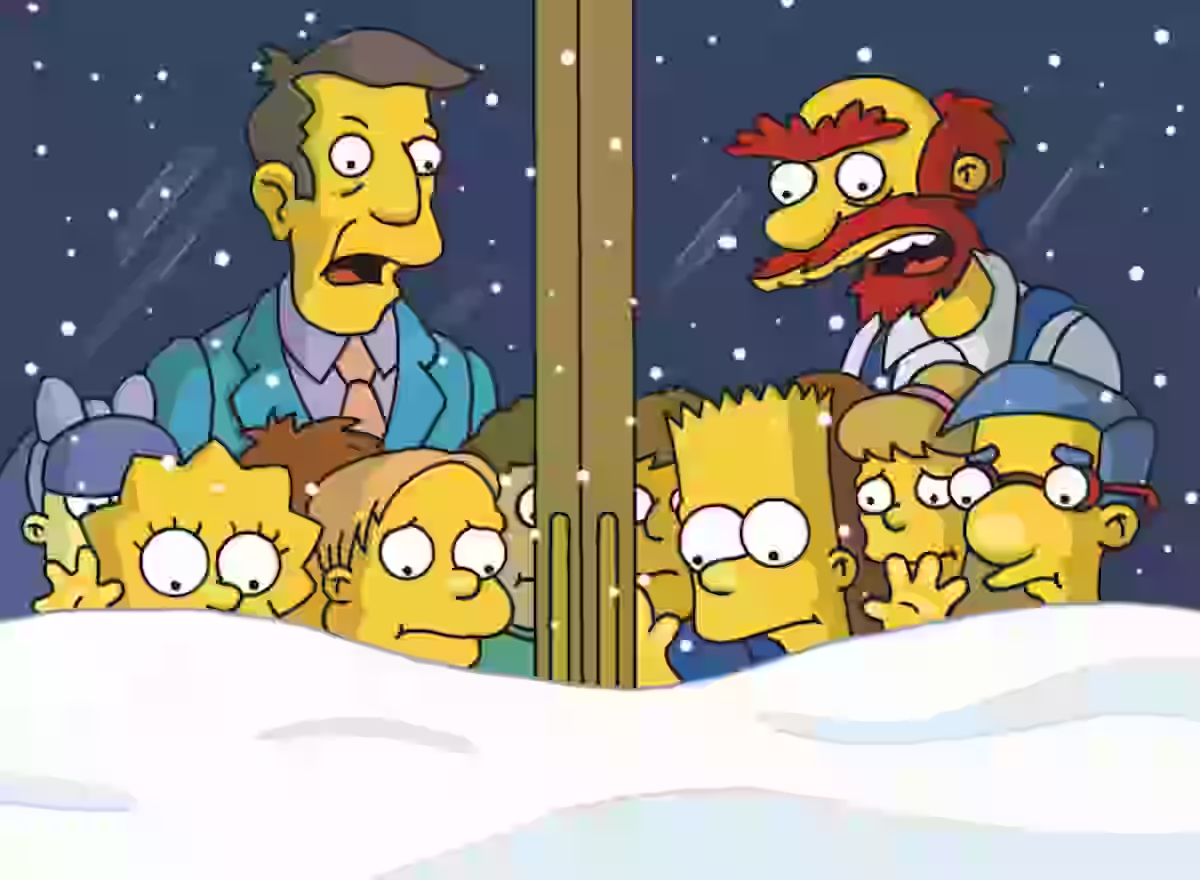
A chilling Simpsons weather prediction is circulating online that might make you stock up on winter supplies earlier than planned. This one is absolutely terrifying when you see the meteorological evidence.
Episode Reference: Skinner’s Sense of Snow (Season 12, Episode 8 – December 2000)
This episode depicts a massive, unexpected snowstorm that traps the children of Springfield Elementary inside their school, creating a survival situation that quickly spirals into chaos.
A violent blizzard strikes Springfield during a circus performance, forcing an early end to the show and burying the entire town under feet of snow.
Principal Skinner refuses to close the school despite the dangerous conditions, leading to students and staff becoming trapped inside.
What Happened: Massive snowstorm traps entire town
The snowstorm in the episode is described as “demonic” and completely unexpected, catching everyone off guard.
Homer and Flanders attempt to rescue the children using Ned’s car modified as a makeshift snowplow, but they get frozen in ice after hitting a fire hydrant.
Social media platforms including Facebook and TikTok have widely shared clips claiming this episode predicted “The Coldest Week in U.S. History” occurring January 19-25, 2026.
In the referenced scenes, Springfield faces terrifying weather conditions where communication networks fail as temperatures plummet to deadly levels.
Even weather reporters in the show appear frightened by the unprecedented cold front approaching the town.
Why It’s Happening in 2026: La Niña Patterns, NOAA Forecasts, Climate Volatility
Remarkably, meteorological data supports this prediction with scientific evidence. NOAA forecasts confirm La Niña conditions are favored to continue into Northern Hemisphere winter 2025-2026.
Climate experts predict a 71% chance of La Niña during October-December 2025, with chances decreasing to 54% between December-February 2026.
Afterward, transition to ENSO-neutral conditions is expected by January-March 2026.
Historical data shows La Niña typically brings cooler, wetter conditions to the northern United States.
Furthermore, since the 1990s, five out of fifteen La Niña snow seasons ranked among the snowiest third of all records.
Climate models show colder-than-normal conditions are slightly favored across northern regions, with potential for extreme cold snaps during the predicted timeframe.
Reality Check: 🟡 Highly Probable
Given NOAA’s official forecast and historical La Niña impacts, this prediction earns a highly probable rating. Certainly not every La Niña brings extreme cold, yet weather patterns have become increasingly variable and unpredictable.
Should we be preparing for the worst? The Simpsons seems to think so. And their track record speaks for itself.
17. Zombie Apocalypse

This one may seem like a stretch, but it’s one Simpsons prediction that still hasn’t come to pass. So we can’t rule anything out yet.
Episode Reference: Treehouse of Horror (Various Episodes)
In this chilling episode, a zombie apocalypse takes over Springfield, home to the Simpsons. A fast-food restaurant serves a burger that turns people zombie-like. A news reporter announces:
“This lucky reporter will be the first human to sample this delicious crime against nature,”
Before transforming into a zombie himself.
What Happened: Zombie outbreak takes over Springfield
Everyone except the Simpson family turns into zombies, leading to widespread chaos and confusion. The episode presents it in comedic light, but a real-life zombie apocalypse would result in major global catastrophe.
While the possibility of a real zombie apocalypse with reanimated corpses is extremely slim, we can’t dismiss the underlying concept as pure fiction.
I started thinking about this prediction differently after COVID-19. Watching people panic-buy toilet paper, fight in stores over supplies, and exhibit herd behavior during crisis, that was zombie movie behavior without actual zombies.
Why It’s Happening in 2026: CDC preparedness warnings, social breakdown risks
According to the CDC, they’ve actually published a “Zombie Preparedness” guide that uses zombie apocalypse as a framework for general emergency preparedness.
The skills needed to survive a zombie outbreak are identical to those needed for hurricanes, pandemics, or civil unrest. The CDC isn’t joking around; they’re using the metaphor to teach real survival skills.
The episode might be satirizing how quickly social order can break down when people are scared and resources become scarce.
We saw glimpses of this during 2020 when grocery stores emptied and people hoarded supplies in response to pandemic fears.
Could 2026 be the year we see zombies in our streets? Literal undead zombies? Almost certainly not.
But could we see a “zombie-like” scenario defined as mass social breakdown and behavioral changes triggered by crisis? Unfortunately, that’s not as far-fetched.
According to emergency management experts, supply chain disruptions, economic collapse, or another pandemic could trigger social breakdown that mimics apocalyptic scenarios without supernatural elements.
The form might be different from Hollywood zombies, but the chaos could be real.
Reality Check: 🟢 Possible
I’m not trying to fearmonger, but The Simpsons often uses supernatural metaphors to represent real social anxieties. The zombie apocalypse episode might be warning about how fragile our civilization really is when crisis hits.
Final Thoughts On The Simpsons Predictions for 2026
Considering that more than 55 seemingly simple scenes from The Simpsons have come true in real life, we’d be doing ourselves a disservice by dismissing these scenarios as mere fiction.
The evidence speaks for itself: The Simpsons have an uncanny track record that demands our attention. Who would have thought a yellow-skinned, four-fingered cartoon family could give Nostradamus a run for his money?
The Simpsons predictions for 2026 are genuinely insane. Whether it’s Portugal winning the 2026 world cup, another pandemic called SEERS, robots taking our jobs, or potential world conflicts, one thing is certain: the future is looking disturbingly similar to what this animated series has been showing us for decades.
But at the end of the day, The Simpsons isn’t just a cartoon series; it’s a secret into the world of the illuminati.
The writers aren’t prophet, but they must definitely be part of the illuminati or freemasonry.
We’ll have to wait and see how everything plays out in 2026. Will Portugal win the World Cup, AI cause mass unemployment, economic crisis reach a breaking point and flying cars become commercially available?
Some of these predictions will come true. Others won’t. But based on their track record, we should probably pay attention to the warnings embedded in the comedy.
Share your thoughts and theories in the comments below – I genuinely want to hear which predictions you think are most likely and which seem too crazy even for The Simpsons.
Frequently Asked Questions About The Simpsons Predictions for 2026
1. Has The Simpsons really predicted the future?
Yes, The Simpsons has accurately predicted over 30 major events, including Trump’s presidency, technological innovations like smartwatches and video calling, the FIFA corruption scandal, and the Disney-Fox merger. While some dismiss these as coincidences, the specificity and consistency suggest genuine pattern recognition by the writers.
2. What is The Simpsons’ most shocking prediction for 2026?
The most concerning predictions for 2026 include AI causing mass unemployment, potential economic collapse, and escalating global conflicts. The most testable specific prediction is Portugal winning the World Cup, which will be verifiable when the tournament occurs.
3. Do The Simpsons writers have insider knowledge about the future?
The writers have consistently denied having insider information or prophetic abilities. Many have backgrounds in mathematics, science, and academia, giving them strong analytical skills for identifying trends. The show’s longevity and massive content volume also increase statistical likelihood of accurate predictions.
4. Which Simpsons predictions haven’t come true yet?
Several predictions remain unfulfilled, including widespread hover cars as primary transportation, humans living on Mars, a female U.S. president, literal zombie apocalypse, and AI robots completely replacing human workers. These may still occur as technology and society continue evolving.
5. Should we take The Simpsons predictions seriously?
While the show is entertainment and not prophecy, its track record warrants attention to underlying trends it identifies. The predictions often highlight real concerns about technology, politics, and society that experts are also warning about. Taking them seriously doesn’t mean believing everything will happen exactly as shown, but rather recognizing patterns the writers have identified.
6. How do The Simpsons writers make accurate predictions?
According to writer interviews, predictions aren’t intentional. The show creates satirical scenarios based on current trends, technological trajectories, and human behavior patterns. Some scenarios eventually match reality through combination of insight, pattern recognition, and probability. The writers are exceptionally intelligent people who understand complex systems.
7. Will there really be a zombie apocalypse or World War III?
Literal zombies are fiction, but the scenarios metaphorically represent real risks like pandemics, social collapse, and geopolitical conflicts. While dramatic apocalypse is unlikely, experts confirm that risks of major crises (economic, environmental, or conflict-based) are elevated and should be taken seriously.
- Barkeep on The Simpsons: Moe Szyslak Character Guide - January 3, 2026
- KissAnime Alternatives: 17 Verified, Tested & Safe to Use in 2026 - December 17, 2025
- SEERS Pandemic in Brazil 2025: The Dark Secrets the Elites Are Hiding - December 16, 2025
